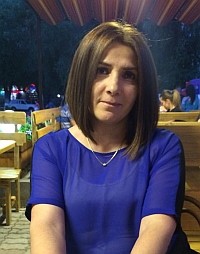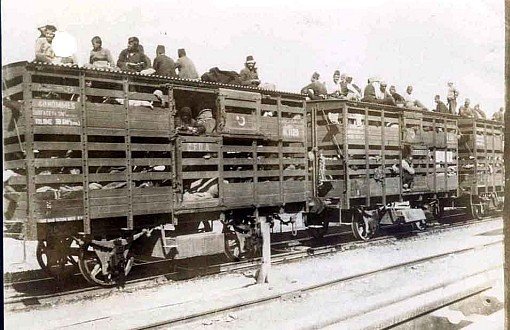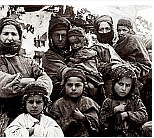
Tells Anahit Ghazaryan...
My Grandmother Srbuhý was born in 1906 in the village of Alyur, Van situated on the eastern shore of Lake Van. My Grandfather Mampré was born in the same village. Their destinies were decided since early childhood: their parents had made “bashikyartma” [a tradition when children were pre-engaged by their parents at young age, tr.]. I don’t know much about my Grandfather Mampré: he didn’t like to talk. Every time my Grandmother began talking about the Genocide he would smoke and sigh deeply. I have more information about my Grandmother Srbuhý. She would often tell as if she couldn’t find relief. She felt endless nostalgia for her native village and kept repeating until the end of her life, “Some day I will go to my Father’s house.”
On the eve of those events Alyur village was living its routine life. A Turkish acquaintance of her Father’s, Grandfather Margar’s, visited them to warn about the anticipated attack. At that moment my Grandmother, her unmarried aunt Noyemzar and her mother Yengibar were at home. When that Turkish friend saw my Grandfather wasn’t at home, offered them to stay in his house. They went and hid for some time but the neighbors noticed there were Armenians in that house, which meant danger for the host. They had to leave that house. This coincided with the moment when awful massacres started in Alyur village. By the way, Alyur was considered the largest village in the district with most Armenian population and had two Armenian churches and a co-educational college. However, the village was burnt to ashes by dawn. Men who had managed to run away survived; others were slaughtered, burnt, killed… Women and children were dragged into the church, the doors were locked. They remained in the church for forty days without food and water. On the forty first day the doors were opened. Most of the captives had died of hunger. Those alive were made to take the road of exile. Passing by Lake Van two women crossed themselves and jumped from the rock…
The group of refugees was taken to Salmast. Here they stayed in tents for some time. On the way of exile, before getting to Salmast my Grandmother’s mother was unable to resist the hardships of the journey; she caught fever. My Grandmother hugged her asking to get up; she tried to make her warm, but her mother died. Her aunt was hardly able to take the child away from her dead mother. Aunt Noyemzar sat under a wall. Soon the gate opened and a woman in a chadrah called them in and fed them. After having a little rest my Grandmother and her Aunt continued their way with another group of refugees. This is how they got to Salmast. From there they went to Baghdad. Grandmother told that they slept under palm trees. From Baghdad they were moved to Batumi by ship. The worst thing is that my Grandmother and her Aunt Noyemzar lost each other in Batum. Meanwhile, my Grandfather Margar followed his family tracks and, perhaps it was destiny, their ships arrived in Batum almost simultaneously. Here he found Noyemzar. They were looking for my Grandmother Srbuhý for quite a long time, but all in vain. Absolutely desperate, he left for America with his sister. Meanwhile, Srbuhý joined another group of refugees. Among the refugees she met Grandfather Mampré. Together they looked for her Aunt but their roads didn’t cross. Grandmother Srbuhý and Grandfather Mampré came to Eastern Armenia, Artashat. Next autumn, in 1921 they arrived in Davalu. My grandparents got married but continued the search. By some miracle my Great-grandfather managed to learn the whereabouts of my Grandmother. It is impossible to describe my Grandmother’s joy of those days… But they were never to meet again. My Grandmother passed away with endless nostalgia in her heart, constantly telling, voicing her sorrow… A fragment of that nostalgia remained in us, in our roots…
* Under the headline "100 years... Real Stories" Information, Analytical Agency "Armedia" presents real stories from the lives of the Genocide survivors (the stories are told by the survivors’ descendants, relatives, close people) collated by "European Integration" Non-Governmental Organization within the project "The Turk Who Saved My Life". The stories are special as the hero/heroes fled the claws of the Great Genocide through the direct or indirect assistance of a Turk/Turks (a neighbor, well-wisher, friend or witness of the event). The project is implemented with the assistance of the United Kingdom Foreign and Commonwealth Office. The presented materials, opinions and conclusions introduce the views of the authors and participants and do not reflect the position of the United Kingdom Government.
* Click here to read the article in Turkish.
Other pieces in the series:
* Aris Nalcı talks about "The Turk Who Saved Me" Project: Story Project Aims to Face the Genocide Without Prejudice
* "Two Offshoot Survivors of Exterminated Dynasties Vowed to Weave Together and Become a Thick Oak"
* "Run, Go, Keep My Light Burning"





.jpg)
